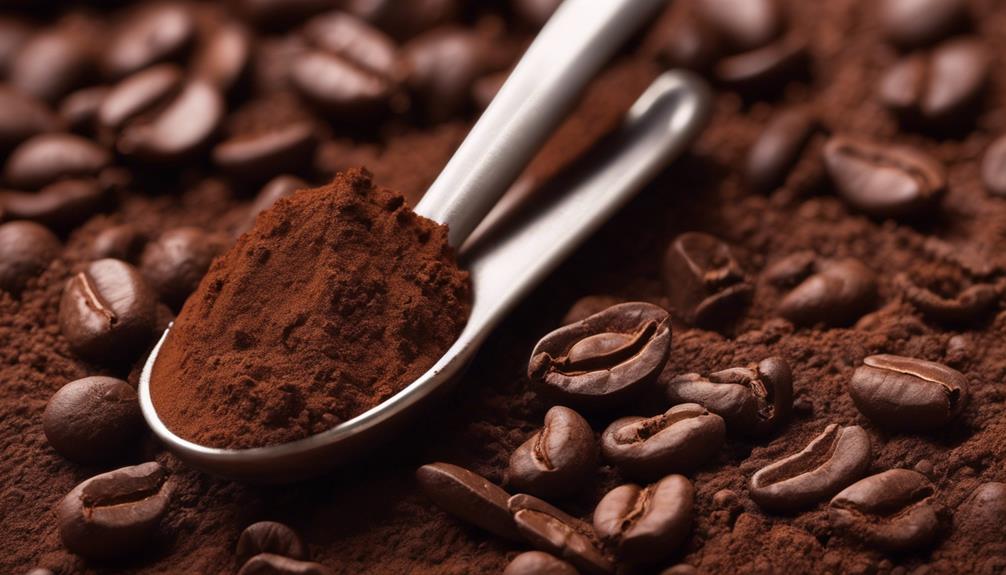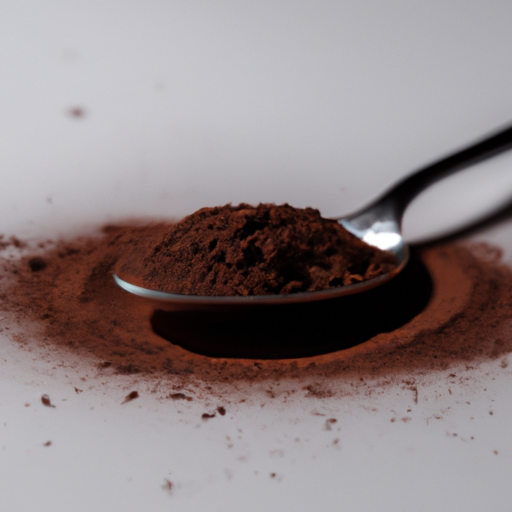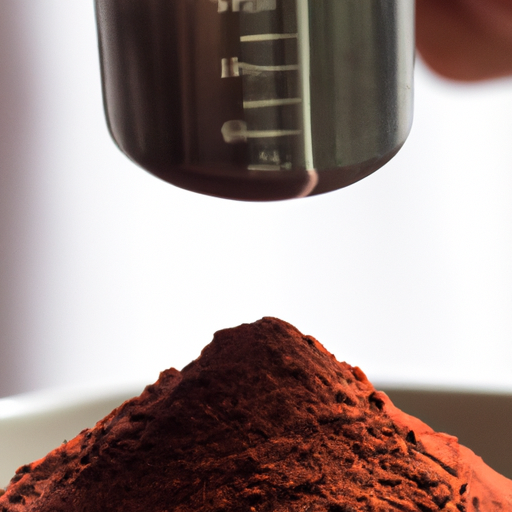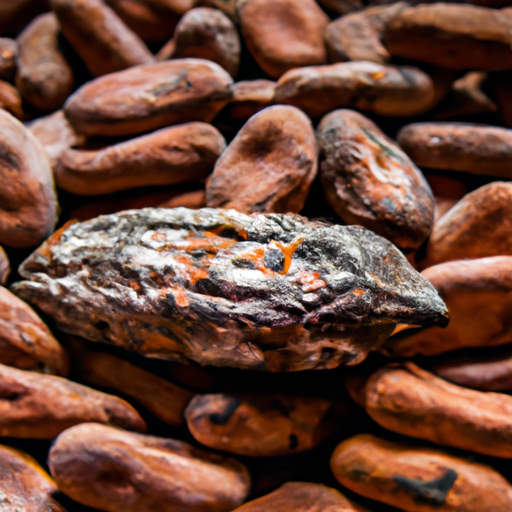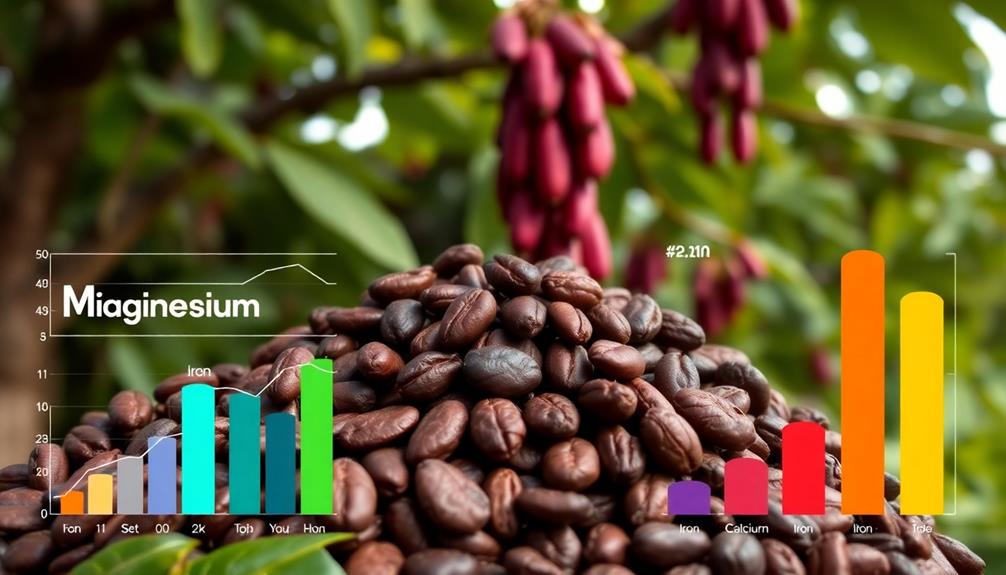In 100 grams of unsweetened cocoa powder, there are approximately 230 milligrams of caffeine. Opting for decaffeinated cocoa powder is a possibility, with the process reducing caffeine levels by 80.1%, while still preserving beneficial components like polyphenols. It is interesting to note the varying caffeine amounts in sweetened cocoa powder, with 230mg in 100g. Cocoa powder actually contains more caffeine than dark chocolate, with 230mg in cocoa compared to 43mg in dark chocolate per 100g. If you are curious to learn more about the disparities in caffeine levels between cocoa and chocolate, the following information may captivate you.
Key Takeaways
- 100g of unsweetened cocoa powder contains 230mg of caffeine
- Decaffeinated cocoa powder retains essential components with 80.1% less caffeine
- 1 oz of unsweetened cocoa has 12 mg of caffeine
- Cocoa powder contains more caffeine than dark chocolate
- Caffeine levels in cocoa powder can vary based on type and processing
Caffeine Content in Cocoa Powder
When considering the caffeine content in cocoa powder, it's crucial to note that 100g of unsweetened cocoa powder contains 230mg of caffeine. This means that if you consume a significant amount of cocoa powder, you might be getting a decent dose of caffeine.
However, if you're someone who's sensitive to caffeine, it's vital to be mindful of your intake. On the bright side, there's decaffeinated cocoa powder available. The decaffeination process can reduce caffeine levels by 80.1%, making it a suitable option for those looking to cut back on their caffeine consumption while still enjoying the benefits of cocoa.
Even in decaffeinated cocoa powder, essential functional components like polyphenols are retained, ensuring you still get those health perks. So, whether you prefer your cocoa with or without caffeine, there's an option out there for you to savor the goodness of cocoa beans without worrying too much about the amount of caffeine you're taking in.
Comparing Cocoa to Chocolate Caffeine
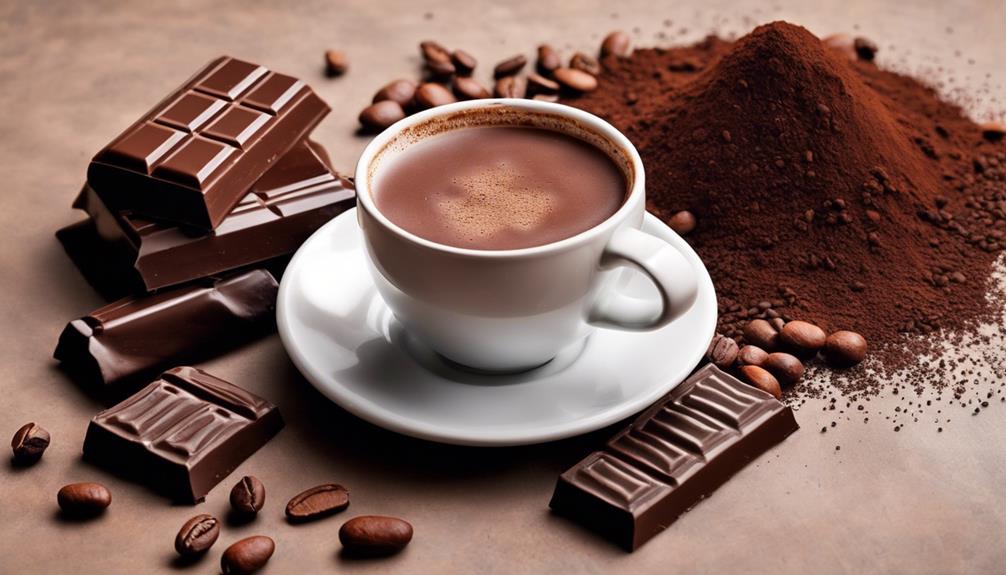
Comparing the caffeine content between cocoa and chocolate reveals notable differences in their respective levels. Cocoa powder contains a high amount of caffeine, with 230 mg per 100g, making it a more potent source compared to both dark and milk chocolate.
Dark chocolate has 43 mg of caffeine per 100g, which is considerably lower than cocoa powder but still more than milk chocolate, which contains 20 mg per 100g. The caffeine in chocolate primarily comes from cocoa solids rather than cocoa butter, explaining why dark chocolate, with its higher cocoa solid content, has higher caffeine levels.
It's important to note that white chocolate, made only from cocoa butter, doesn't contain any caffeine. Some chocolate products, however, may have added caffeine for energy-enhancing purposes, so it's crucial to check labels if you're monitoring your caffeine intake closely.
Cocoa Vs. Coffee: Caffeine Showdown
Cocoa and coffee both contain caffeine, but the amounts differ considerably. While 3.5 oz of cocoa powder can have 230 mg of caffeine, an 8 oz cup of coffee usually ranges from 95-165 mg.
Understanding these variations can help you make informed choices based on your desired caffeine intake and health goals.
Caffeine Content Comparison
How does the caffeine content in cocoa powder stack up against that of coffee in a caffeine showdown?
Cocoa powder contains around 230 mg of caffeine in 3.5 oz, while a typical 8 oz cup of brewed coffee has between 95-165 mg. Decaf coffee, on the other hand, only contains 2-5 mg per cup, much lower than cocoa powder.
Espresso shots offer a different perspective with approximately 63 mg of caffeine per shot, notably less than cocoa powder. The levels of caffeine in cocoa powder can vary depending on the type and processing it undergoes.
Effects on Body
In the battle of caffeine effects on the body, cocoa and coffee offer distinct advantages and benefits.
- Cocoa contains caffeine and is rich in flavanols, which improve blood circulation and combat cell damage.
- Regular brewed coffee provides stimulation and boosts energy and alertness, potentially preventing chronic diseases like liver disease and Type 2 diabetes.
- Unsweetened cocoa powder has 230 mg of caffeine per 3.5 oz serving, while regular brewed coffee contains 95-165 mg per 8 oz cup.
Cocoa is better known for its health benefits due to the high flavanol content, offering improvements in heart health and blood flow. On the other hand, coffee is more commonly associated with providing stimulation and alertness.
Health Benefits of Caffeinated Cocoa
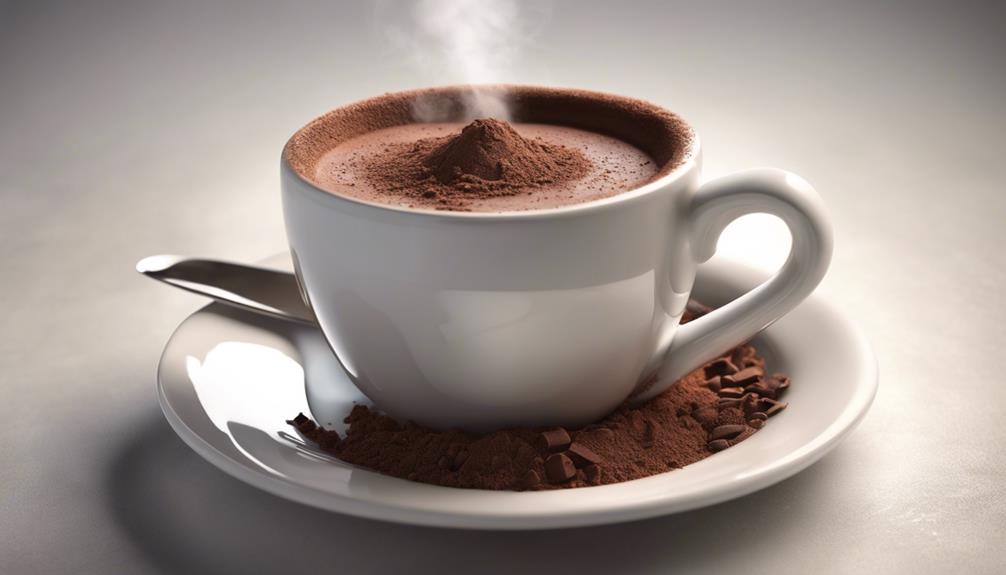
Caffeinated cocoa powder offers a range of health benefits that can boost your well-being. It contains antioxidants that help protect against diseases such as cancer and heart conditions.
Additionally, the theobromine in cocoa can enhance heart health and improve blood circulation.
Cocoa Powder Caffeine Content
Exploring the health benefits of cocoa powder's caffeine content reveals its potential impact on daily consumption. When considering cocoa powder caffeine content, there are a few key points to keep in mind:
- 1 tbsp of cocoa powder contains 12 mg of caffeine.
- Sweetened cocoa powder has 230 mg of caffeine per 100g.
- Dutching reduces caffeine in cocoa powder by 2/3.
Understanding these aspects can help tailor your cocoa powder consumption to align with your preferences and needs. Whether you enjoy a slight caffeine boost or prefer a lower caffeine intake, being aware of these factors can guide your choices when indulging in cocoa-infused treats.
Energy Boost Potential
When considering the health benefits of caffeinated cocoa, one can't overlook its potential to provide a natural energy boost. Caffeinated cocoa powder contains caffeine, which can enhance alertness, focus, and energy levels. This boost in energy is similar to what one might experience from a cup of coffee.
By consuming caffeinated cocoa, you can combat fatigue and improve cognitive function. The caffeine present in cocoa powder contributes to its stimulating properties, offering an excellent alternative to coffee for increasing energy.
Antioxidant Properties
Rich in antioxidants, particularly flavonoids, caffeinated cocoa powder offers numerous health benefits that protect against various diseases like cancer, cardiovascular issues, and Alzheimer's.
- The flavonoids in cocoa powder have a higher capacity than those in fruits like blueberries, cranberries, and pomegranates.
- Cocoa powder contains more polyphenols and flavanols than many fruit powders, contributing to its protective effects against diseases.
- Diets rich in polyphenols from cocoa may help prevent conditions such as cancers, diabetes, and neurodegenerative diseases.
Caffeine Levels in Various Chocolates
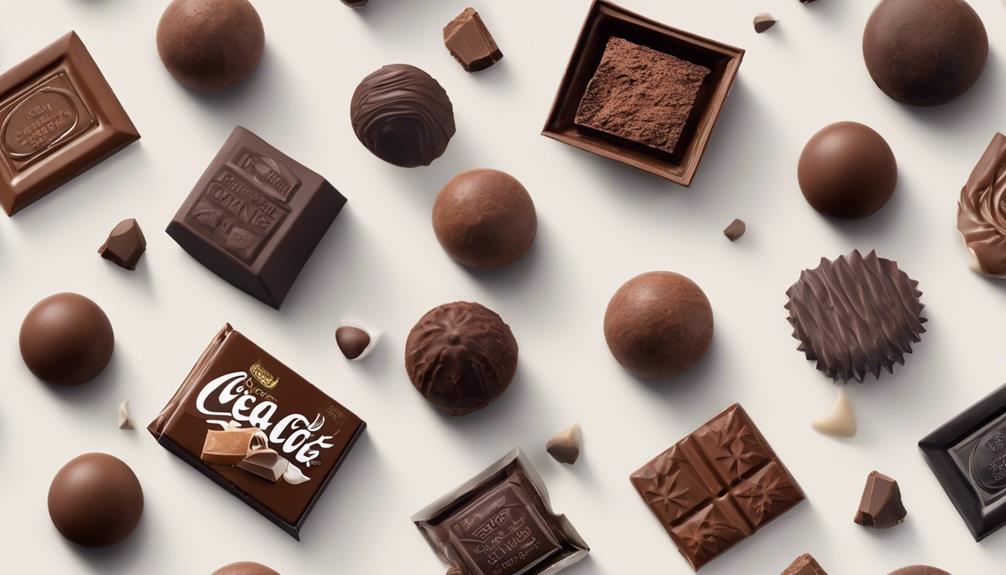
Among different types of chocolates, the caffeine content varies considerably. Dark chocolate contains around 43 mg per 100 grams, while milk chocolate has approximately 20 mg per 100 grams. In contrast, cocoa powder boasts a higher caffeine content at about 230 mg per 100 grams. When enjoying these treats, one must be mindful of the caffeine levels they contain.
If you're looking for a little pick-me-up, a small piece of dark chocolate might provide a slight energy boost due to its caffeine content. On the other hand, milk chocolate has less caffeine, making it a milder choice. For those seeking a more potent source of caffeine, incorporating cocoa powder into your recipes could be the way to go.
Impact of Caffeine in Hot Cocoa

With varying caffeine levels in different brands and preparation methods, the impact of caffeine in hot cocoa can differ immensely. When considering the caffeine content in hot cocoa, it's crucial to recognize that cocoa powder contains caffeine, but the levels are generally lower compared to coffee. Here are some key points to understand better:
- Hot cocoa made with cocoa powder typically has lower caffeine content than coffee.
- The caffeine content in hot cocoa can vary depending on the brand and preparation method used.
- While hot cocoa may not provide as much stimulation as coffee due to its lower caffeine levels, it still offers a comforting and enjoyable beverage option.
Understanding the caffeine levels in hot cocoa can help you make informed choices about your beverage preferences. Whether you prefer the rich taste of cocoa or the boldness of coffee, knowing the caffeine content in each can guide your selection.
Cocoa Powders Caffeine: The Facts
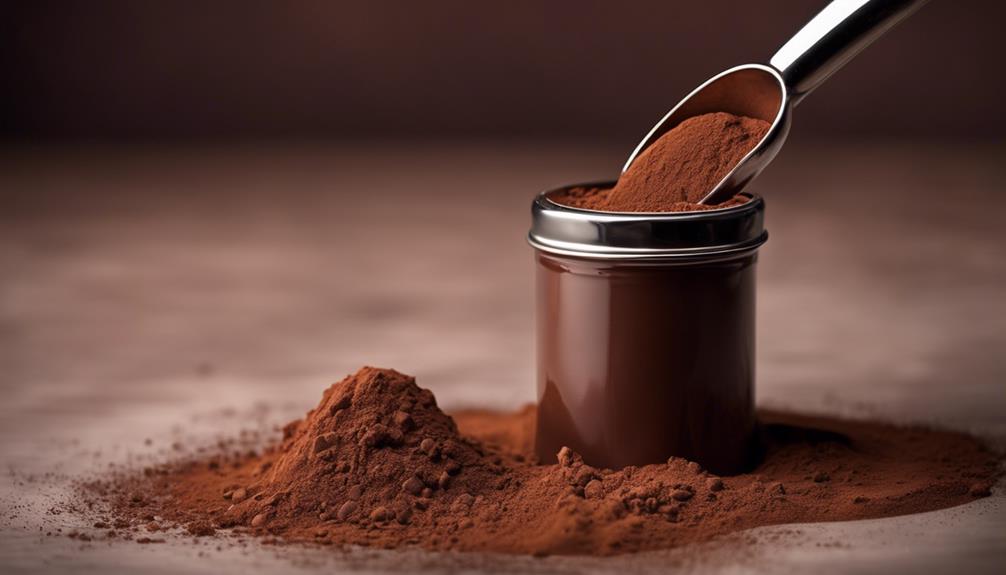
In the realm of cocoa powders, caffeine is a significant component, with pure cocoa powder containing varying amounts of this stimulant. When we explore the world of cocoa, we find that 1 tablespoon of pure cocoa powder can pack around 12 mg of caffeine, while 100g of sweetened cocoa powder can contain as much as 230 mg of caffeine. If you're looking to reduce your caffeine intake, decaffeinated cocoa powder could be a suitable option, reducing caffeine content by approximately 80.1% while still preserving other beneficial compounds like theobromine and polyphenols.
Comparing the caffeine content in cocoa to that in coffee, 3.5 oz of cocoa powder boasts 230 mg of caffeine, while a standard 8 oz cup of coffee can range from 95-165 mg. It's also important to note that cocoa is rich in flavanols, offering numerous nutritional benefits, whereas coffee is often preferred for its stimulating effects on energy and alertness. Understanding the differences between cacao and cocoa, along with the roasting process, can help you make informed choices about your daily caffeine intake.
Frequently Asked Questions
Is There More Caffeine in Cocoa Than Coffee?
Yes, there is more caffeine in cocoa powder compared to decaf coffee, but less than regular coffee. Cocoa powder contains 230 mg of caffeine per 100g, while decaf coffee only has 2-5 mg per 8 oz cup.
How Much Caffeine Is in Hershey's Cocoa Powder?
I enjoy a spoonful of Hershey's Cocoa Powder in my morning oatmeal. It adds a hint of chocolate without overwhelming me with caffeine. Just 12 mg per tablespoon makes it a cozy choice.
How Much Caffeine Is in Dutch Processed Cocoa?
Dutch processed cocoa, depending on the brand, can contain around 50-60 mg of caffeine per 100g. The Dutching process reduces acidity and bitterness, altering flavor and color. It's commonly used in baking and confectionery for its milder taste.
Does Cocoa Powder Keep You Awake?
Feeling cozy after sipping cocoa? Let me share a secret – cocoa powder can keep you awake with its caffeine kick. So, if sleep beckons, maybe save that chocolatey treat for earlier.
Is Cacao Powder a Good Source of Caffeine?
Yes, cacao powder is a good source of caffeine. It contains about 12 mg of caffeine per tablespoon, making it a natural energy booster. For the best cacao near me, check out local health food stores or specialty grocery stores for high-quality options.
Conclusion
To wrap up, cocoa powder contains a small amount of caffeine compared to coffee but more than most chocolates. It can provide a mild energy boost and has potential health benefits when consumed in moderation.
Remember, moderation is key when enjoying caffeinated cocoa products to avoid any negative side effects. So, next time you reach for a cup of hot cocoa, keep in mind the caffeine content and enjoy it responsibly for a delightful treat.

